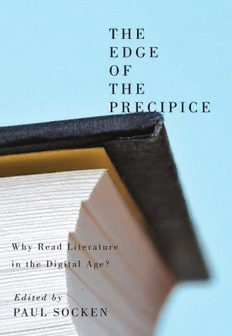
The edge of the precipice: why read literature in the digital age? PDF
Preview The edge of the precipice: why read literature in the digital age?
The Edge of the Precipice The Edge of the Precipice Why Read Literature in the Digital Age? Edited by Paul Socken McGill-Queen’s University Press Montreal & Kingston | London | Ithaca © McGill-Queen’s University Press 2013 “The End of Reading” by Alberto Manguel © Yale University Press ISBN 978-0-7735-4178-8 (cloth) ISBN 978-0-7735-8987-2 (ePDF) ISBN 978-0-7735-8988-9 (ePUB) Legal deposit third quarter 2013 Bibliothèque nationale du Québec Printed in Canada on acid-free paper that is 100% ancient forest free (100% post- consumer recycled), processed chlorine free This book has been published with the help of a grant from the Canadian Federation for the Humanities and Social Sciences, through the Awards to Scholarly Publications Program, using funds provided by the Social Sciences and Humanities Research Council of Canada. McGill-Queen’s University Press acknowledges the support of the Canada Council for the Arts for our publishing program. We also acknowledge the financial support of the Government of Canada through the Canada Book Fund for our publishing activities. LIBrary aND archIveS caNaDa cataLogUINg IN PUBLIcatIoN The edge of the precipice : why read literature in the digital age? / edited by Paul Socken. Includes bibliographical references and index. Issued in print and electronic formats. ISBN 978-0-7735-4178-8 (bound). – ISBN 978-0-7735-8987-2 (ePDF). – ISBN 978-0-7735-8988-9 (ePUB) 1. Literature and the Internet. 2. Literature and technology. 3. Books and reading – Social aspects. 4. Books and reading – Technological innovations. I. Socken, Paul, 1945–, editor of compilation PN56.I64e34 2013 809’.911 c2013-902454-9 c2013-902455-7 Set in 11/13.5 Filosofia with Avenir Next Condensed Book design and typesetting by Garet Markvoort, zijn digital For my wife, Rochelle, and my children and grandchildren Contents Introduction: A Return to the Educated Imagination | Paul Socken 3 Technology, Science, and the Book Why I Read War and Peace on a Kindle (and Bought the Book When I Was Done) | Michael Austin 13 Reading in a Digital Age: Notes on Why the Novel and the Internet Are Opposites, and Why the Latter Both Undermines the Former and Makes It More Necessary | Sven Birkerts 27 Solitary Reading in an Age of Compulsory Sharing | Drew Nelles 42 Literature and the World (Part One) Literature as Virtual Reality | Stephen Brockmann 55 How Molière and Co. Helped Me Get My Students Hooked on Literature | Leonard Rosmarin 72 Physical and Philosophical Approaches A World without Books? | Vincent Giroud 91 Language Speaks Us: Sophie’s Tree and the Paradox of Self | Mark Kingwell 109 Poetic Readings The End of Reading | Alberto Manguel 129 Cold Heaven, Cold Comfort: Should We Read or Teach Literature Now? | J. Hillis Miller 140 Fragments from an Entirely Subjective Story of Reading | Lori Saint-Martin 156 A Very Good Chance of Getting Somewhere Else | Katia Grubisic 161 Literature and the World (Part Two) Thinking Deeply in Reading and Writing | Keith Oatley 175 Don’t Panic: Reading Literature in the Digital Age | Ekaterina Rogatchevskaia 192 Why Read against the Grain? Confessions of an Addict | Gerhard van der Linde 207 About the Authors 223 Index 229 viii | Contents The Edge of the Precipice
